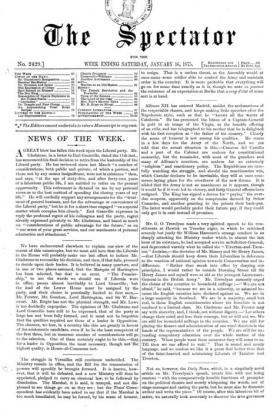Alfonso XII. has entered Madrid, amidst the acclamations of the
respectable classes, and keeps making little speeches after the Napoleonic style, such as that he " knows all the wants of Catalonia." He has presented the baton of a Captain-General in gold to an image of the Virgin, as the humble offering of an exile, and has telegraphed to his mother that he is delighted with his first reception as " the father of his country." Clearly the sense of humour is not among his qualities. He starts in a few days for the Army of the North, and we are told that the actual situation is this,—Canovas del Castillo and a part of the Cabinet are zealous for constitutional monarchy, but the remainder, with most of the grandees and many of Alfonso's courtiers, are zealous for an extremely " religittua " and reactionary policy. The Republicans are care- fully watching the struggle, and should the reactionaries win, which Castelar declares to be inevitable, they will at once com- mence laying plans for the overthrow of the new throne. It is added that the Army is not so unanimous as it appears, though it would be if it were led to victory, and forty General officers have resigned. The King has signed a decree for " paying" the over- due coupons, apparently on the compromise decreed by Senor Camacho, and another granting to the priests their back-pay. The latter would probably prefer their future pay, if they could only get it in cash instead of promises.


































